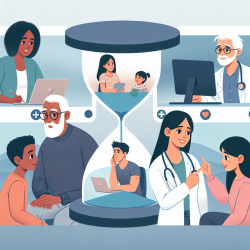As a practitioner in the field of speech-language pathology, staying updated with the latest research is crucial for delivering effective therapy. The article "News and Notes," published in the journal Mental Health (Lond), offers valuable insights that can significantly enhance your practice. This blog post will explore key takeaways from the research and provide actionable steps to implement these findings in your online therapy sessions.
Key Insights from "News and Notes"
The article highlights several critical areas that can improve the quality of online therapy services:
- Client Engagement: Effective engagement strategies are essential for maintaining client interest and participation, especially in an online setting.
- Data-Driven Decision Making: Utilizing data to guide therapy sessions can lead to more personalized and effective treatment plans.
- Interdisciplinary Collaboration: Working with other professionals can provide a more holistic approach to therapy.
Implementing the Findings
Here are some practical steps to incorporate these insights into your online therapy practice:
1. Enhance Client Engagement
Engagement is a cornerstone of effective therapy. To improve client engagement, consider the following strategies:
- Interactive Tools: Use interactive tools and games to make sessions more engaging.
- Regular Feedback: Provide regular feedback to clients and their families to keep them motivated.
- Personalized Sessions: Tailor sessions to meet the individual needs and interests of each client.
2. Utilize Data-Driven Decision Making
Data can be a powerful tool in enhancing therapy outcomes. Here’s how you can leverage data in your practice:
- Track Progress: Use data to monitor client progress and adjust therapy plans as needed.
- Outcome Measures: Implement standardized outcome measures to assess the effectiveness of your interventions.
- Feedback Loops: Create feedback loops where data is regularly reviewed and used to inform decision-making.
3. Foster Interdisciplinary Collaboration
Collaboration with other professionals can provide a more comprehensive approach to therapy. Consider these methods:
- Regular Meetings: Schedule regular meetings with other professionals involved in your client’s care.
- Shared Goals: Establish shared goals and treatment plans with other professionals.
- Communication Channels: Maintain open and consistent communication channels to share insights and updates.
Encouraging Further Research
While the insights from "News and Notes" are invaluable, it’s essential to stay curious and continue exploring new research. Engaging in ongoing professional development and staying abreast of the latest studies can help you refine your skills and improve therapy outcomes.
To read the original research paper, please follow this link: News and Notes.










